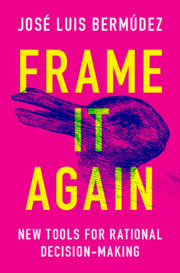Book contents
- Frame It Again
- Frame It Again
- Copyright page
- Contents
- Figures
- Tables
- Acknowledgments
- 1 Priming the Pump: Framing Effects and the Litany of Human Irrationality
- 2 Framing: The Classic Experiments
- 3 Where the Rubber Hits the Road: Investors, Frames, and Markets
- 4 Juliet’s Principle
- 5 Rational Frames?
- 6 Agamemnon and Climate Change
- 7 Framing Temptation and Reward: The Challenges of Self-Control
- 8 Chickens and Chariot Races: Framing in Game Theory
- 9 Fair’s Fair: Framing for Cooperation and Fairness
- 10 Getting Past No: Discursive Deadlock and the Power of Frames
- 11 Opening the Door to Non-Archimedean Reasoning
- Appendix Frames in the Brain
- Bibliography
- Index
7 - Framing Temptation and Reward: The Challenges of Self-Control
Published online by Cambridge University Press: 15 October 2020
- Frame It Again
- Frame It Again
- Copyright page
- Contents
- Figures
- Tables
- Acknowledgments
- 1 Priming the Pump: Framing Effects and the Litany of Human Irrationality
- 2 Framing: The Classic Experiments
- 3 Where the Rubber Hits the Road: Investors, Frames, and Markets
- 4 Juliet’s Principle
- 5 Rational Frames?
- 6 Agamemnon and Climate Change
- 7 Framing Temptation and Reward: The Challenges of Self-Control
- 8 Chickens and Chariot Races: Framing in Game Theory
- 9 Fair’s Fair: Framing for Cooperation and Fairness
- 10 Getting Past No: Discursive Deadlock and the Power of Frames
- 11 Opening the Door to Non-Archimedean Reasoning
- Appendix Frames in the Brain
- Bibliography
- Index
Summary
Many of the examples of framing that we’ve been looking at have been dramatic, both literally and metaphorically. It is hard to imagine anything much more dramatic than Agamemnon contemplating the sacrifice of his beloved daughter, or Macbeth grappling with remorse as he fights to retain his ill-won kingdom. It’s now time to come back down to earth. It’s time to put these ideas about quasi-cyclical preferences and ultra-intensionality to work, so that we can see how framing can be important in everyday decision-making of the sort that we all grapple with on a daily, or near-daily, basis.
My topic for this chapter is individual self-control. The problem here is really one of coordination. How do individuals coordinate their present, past, and future selves over time? How do they stick to their commitments and avoid falling into temptation? In the next chapter we will move from the individual to the group and look at how social groups can come together to collaborate and cooperate.
Information
- Type
- Chapter
- Information
- Frame It AgainNew Tools for Rational Decision-Making, pp. 138 - 163Publisher: Cambridge University PressPrint publication year: 2020
